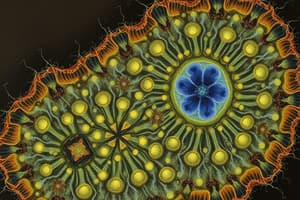Podcast
Questions and Answers
What is the main function of cells in living organisms?
What is the main function of cells in living organisms?
- Sending signals to the brain
- Maintaining body temperature
- Carrying out all vital functions (correct)
- Producing oxygen for respiration
Which of the following is NOT a function carried out by cells?
Which of the following is NOT a function carried out by cells?
- Reproduction
- Energy production
- Growth
- Detecting light (correct)
What is taxonomy primarily concerned with?
What is taxonomy primarily concerned with?
- Creating new species
- Studying the behavior of animals in the wild
- Analyzing DNA sequences
- Classifying and naming organisms based on shared characteristics (correct)
In Linnaean classification, what two components make up the unique binomial nomenclature of a species?
In Linnaean classification, what two components make up the unique binomial nomenclature of a species?
What does the term 'Homo sapiens' signify within the Linnaean classification system?
What does the term 'Homo sapiens' signify within the Linnaean classification system?
What is the central concept of Darwin's theory of natural selection?
What is the central concept of Darwin's theory of natural selection?
Which molecules are fundamental to genetics and carry essential instructions for development?
Which molecules are fundamental to genetics and carry essential instructions for development?
What does ecology primarily study in the context of organisms and their environment?
What does ecology primarily study in the context of organisms and their environment?
How do new species form according to evolutionary processes?
How do new species form according to evolutionary processes?
Where do genes store essential information within a cell?
Where do genes store essential information within a cell?
Flashcards are hidden until you start studying
Study Notes
Exploring Science Through Biological Lenses
Biology, one of the most captivating branches within science, delves into the intricate workings of life itself. From microscopic organisms like bacteria to complex ecosystems teeming with diverse species, biologists unravel the mysteries of life's evolutionary journey and seek to understand its endless variety. This overview will introduce you to some fundamental concepts in biological sciences across several key areas.
Cells: Life's Building Blocks
At the core of every living being lies cells—the smallest units capable of carrying out all vital functions. Typically sporting a nucleus containing genetic information, these tiny entities house proteins and other molecules responsible for growth, reproduction, energy production, and more. As cells come together in specific arrangements, they give rise to tissues, organs, and ultimately entire organisms.
Taxonomy: Organizing the Tree of Life
The field of taxonomy classifies and names organisms based upon shared characteristics, aiming to construct a logical hierarchy. Within this system, known as Linnaean classification, each species is assigned a unique binomial nomenclature consisting of two Latin names: genus and species. For instance, Homo sapiens refers to humans as part of the Homo genus, while sapien denotes their distinct species status within it.
Evolution: Adaptation through Time
Evolution explains how various forms of life have changed over time; from simple beginnings, to the vast array of complexity we see today. Darwin's theory of natural selection plays a pivotal role here, demonstrating how traits favorable for survival tend to increase in frequency among populations in response to environmental pressures. Over countless generations, these changes lead to new species forming through divergent paths.
Genetics: Passing Information Down Generations
Genetics investigates heredity, or how characteristics pass down from parents to offspring. At the heart of genetics lie DNA and RNA molecules. These colossal chains of interconnected building blocks store and transfer essential instructions controlling development, behavior, and health. A single cell contains thousands of genes—each gene is made up of many base pairs arranged in a linear sequence along double helix strands.
Ecology: Interactions between Species and Habitat
Ecology studies relationships among organisms and their environment, emphasizing interactions such as predator-prey dynamics or symbiotic partnerships between different species. Furthermore, ecologists explore population size fluctuations, habitat requirements, and other factors influencing community structure and stability. Enhancing our understanding of ecological processes can help us better conserve our planet's biodiversity.
Discovering the breadth and depth of biological knowledge offers limitless opportunities for exploration—from the nanoscopic inner workings of a cell to the grandeur of Earth's ecosystems, biology provides a window onto the wondrous world around us.
Studying That Suits You
Use AI to generate personalized quizzes and flashcards to suit your learning preferences.




